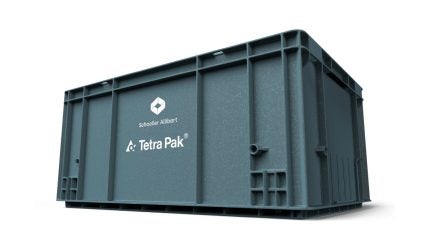
Tetra Pak and Schoeller Allibert are set to introduce transport crates comprising ‘polyAl’, derived from recycled beverage cartons.
The product is being showcased at the Plastics Recycling Show in Amsterdam, the Netherlands. This show is held from today to tomorrow (1-2 April).
Schoeller Allibert, a producer of returnable transport packaging, has created these crates by integrating up to 50% polyAl sourced from used beverage cartons, along with raw materials obtained from other recycled streams, all without utilising any virgin materials.
The crates offer a sustainable and cost-effective alternative to traditional crates.
They are currently undergoing intensive field tests to assess their quality and durability.
Upon their validation, Tetra Pak plans to replace more than 50,000 crates used at its global spare parts distribution centre in Lund, Sweden.
In addition to working with Tetra Pak, Schoeller Allibert is engaging with other companies to promote the use of polyAl for returnable transport packaging requirements.
Schoeller Allibert sustainability and strategic marcom vice-president Britta Wyss Bisang said: “For our customers, making supply chains more sustainable is a key priority, and material innovation is one of the main drivers in making that happen.
“That’s why we are heavily investing in new ways to reduce the use of virgin plastic and use recycled materials such as polyAl.”
In the recycling process, the fibres from cartons are extracted at paper mills. The leftover mixture of polymers and aluminium can then be transformed into polyAl pellets, which can be used to create products such as pallets, crates, logistics packaging, and outdoor furniture.
Tetra Pak sustainability operations vice-president Kinga Sieradzon said: “Aseptic cartons are crucial to providing food access and safe nutrition. And, at Tetra Pak, we know how important it is to also consider its end of life, keeping valuable materials in use.
“Over the years, we have been exploring viable applications for the recycled material polyAl, and we are pleased to see that our collaboration with Schoeller Allibert has resulted in a robust, competitive industrial product.
“We will continue to work with recyclers around the world to develop commercially viable products and expand their end market, thereby helping to reduce virgin plastic use and driving progress towards a circular economy.”
In October last year, Tetra Pak and Lactalis launched a carton using recycled polymers derived from used beverage cartons.




